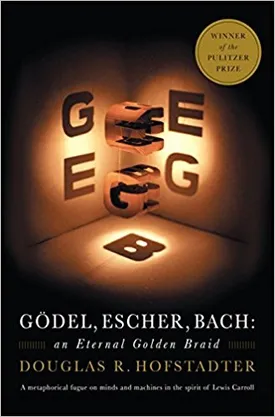Douglas R. Hofstadter
Douglas R. Hofstadter is an acclaimed American scientist and author best known for his Pulitzer Prize-winning 1979 book Gödel, Escher, Bach: An Eternal Golden Braid, a groundbreaking exploration of several interrelated fields such as mathematics, logic, cognitive science and philosophy.
Born in 1945 in New York City, Hofstadter was raised in the suburbs of New Jersey and went on to earn his bachelor’s degree in physics from Stanford University in 1965. After doing post-graduate work in math and computer science at Berkeley, Hofstadter taught computer science at Indiana University from 1973 until his retirement in 2008.
In addition to his academic work, Hofstadter wrote two books: Fluid Concepts and Creative Analogies: Computer Models of the Fundamental Mechanisms of Thought, published in 1995, and I Am a Strange Loop, which was released in 2007 and earned the prestigious American Book Award in 2008.
Gödel, Escher, Bach: An Eternal Golden Braid is considered Hofstadter’s magnum opus and a landmark work of scientific literature. Displaying characteristic wit and erudition, Hofstadter argues that the structures of mathematics, logic and language are mirrors of oneanother, and that this correspondence affects the way we think of ourselves and the universe at large. At its heart, the book is an investigation into the concept of "strange loops", a term Hofstadter coined to describe the self-referential patterns found in many areas of life.
The book received widespread critical acclaim, earning the Pulitzer Prize in 1980 and bringing Hofstadter international recognition. It has been praised by luminaries such as Stephen Hawking and Bill Gates, and has been read by millions of people around the globe.
Hofstadter’s other books examine similar themes to Gödel, Escher, Bach. In Fluid Concepts and Creative Analogies, the author argues that the way we process information is not a one-size-fits-all proposition, and that cognitive processes have many variables that can make us uniquely imaginative or logically rigorous depending on circumstances. This work has been influential in the development of artificial intelligence.
In I Am a Strange Loop, Hofstadter develops the idea of strange loops further. He postulates that consciousness and self-awareness arise out of the patterns of neurons firing in our brains, and that this form of abstract self-reflection is what separates us from other life forms. He then attempts to reconcile this idea with the concepts of God and infinity.
Given the transcendental nature of his work, it’s no surprise that Hofstadter has been compared to masters like Nietzsche and Goethe. He has touched on some of the most enduring and profound questions of life, and his thoughts on the nature of the mind and being remain relevant to this day. An inspiration to scientists and thinkers alike, Douglas R. Hofstadter is a legendary figure in the world of science and literature.

